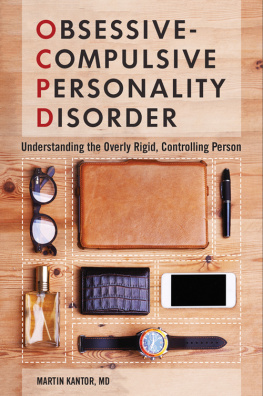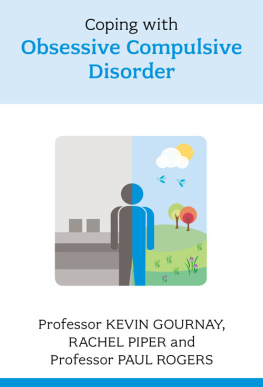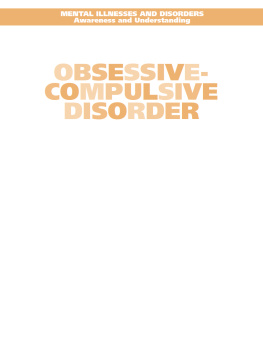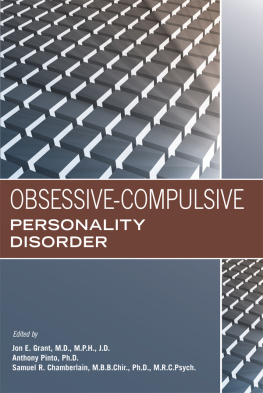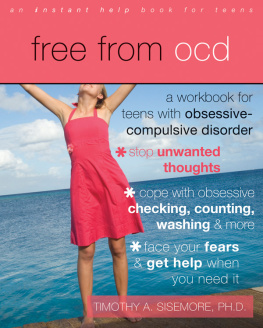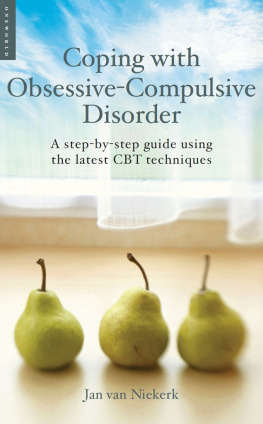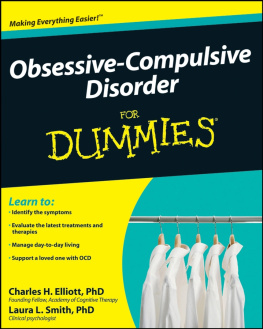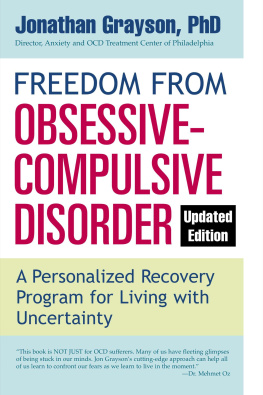Martin Kantor - Obsessive-Compulsive Personality Disorder: Understanding the Overly Rigid, Controlling Person
Here you can read online Martin Kantor - Obsessive-Compulsive Personality Disorder: Understanding the Overly Rigid, Controlling Person full text of the book (entire story) in english for free. Download pdf and epub, get meaning, cover and reviews about this ebook. City: Santa Barbara, year: 2016, publisher: Praeger, genre: Science. Description of the work, (preface) as well as reviews are available. Best literature library LitArk.com created for fans of good reading and offers a wide selection of genres:
Romance novel
Science fiction
Adventure
Detective
Science
History
Home and family
Prose
Art
Politics
Computer
Non-fiction
Religion
Business
Children
Humor
Choose a favorite category and find really read worthwhile books. Enjoy immersion in the world of imagination, feel the emotions of the characters or learn something new for yourself, make an fascinating discovery.
- Book:Obsessive-Compulsive Personality Disorder: Understanding the Overly Rigid, Controlling Person
- Author:
- Publisher:Praeger
- Genre:
- Year:2016
- City:Santa Barbara
- Rating:3 / 5
- Favourites:Add to favourites
- Your mark:
- 60
- 1
- 2
- 3
- 4
- 5
Obsessive-Compulsive Personality Disorder: Understanding the Overly Rigid, Controlling Person: summary, description and annotation
We offer to read an annotation, description, summary or preface (depends on what the author of the book "Obsessive-Compulsive Personality Disorder: Understanding the Overly Rigid, Controlling Person" wrote himself). If you haven't found the necessary information about the book — write in the comments, we will try to find it.
Martin Kantor: author's other books
Who wrote Obsessive-Compulsive Personality Disorder: Understanding the Overly Rigid, Controlling Person? Find out the surname, the name of the author of the book and a list of all author's works by series.
Obsessive-Compulsive Personality Disorder: Understanding the Overly Rigid, Controlling Person — read online for free the complete book (whole text) full work
Below is the text of the book, divided by pages. System saving the place of the last page read, allows you to conveniently read the book "Obsessive-Compulsive Personality Disorder: Understanding the Overly Rigid, Controlling Person" online for free, without having to search again every time where you left off. Put a bookmark, and you can go to the page where you finished reading at any time.
Font size:
Interval:
Bookmark:


Copyright 2016 by Martin Kantor, MD
All rights reserved. No part of this publication may be reproduced, stored in a retrieval system, or transmitted, in any form or by any means, electronic, mechanical, photocopying, recording, or otherwise, except for the inclusion of brief quotations in a review, without prior permission in writing from the publisher.
Library of Congress Cataloging-in-Publication Data
Names: Kantor, Martin, author.
Title: Obsessive-compulsive personality disorder : understanding the overly rigid, controlling person / Martin Kantor, MD.
Description: Santa Barbara, California : Praeger, 2016. | Includes bibliographical references and index.
Identifiers: LCCN 2016016194| ISBN 9781440837883 (alk. paper) | ISBN 9781440837890 (ebook)
Subjects: LCSH: Obsessive-compulsive disorder.
Classification: LCC RC533 .K364 2016 | DDC 616.85/227dc23 LC record available at https://lccn.loc.gov/2016016194
ISBN: 978-1-4408-3788-3
EISBN: 978-1-4408-3789-0
20 19 18 17 16 1 2 3 4 5
This book is also available as an eBook.
Praeger
An Imprint of ABC-CLIO, LLC
ABC-CLIO, LLC
130 Cremona Drive, P.O. Box 1911
Santa Barbara, California 93116-1911
www.abc-clio.com
This book is printed on acid-free paper 
Manufactured in the United States of America
Contents
Introduction
A lthough a significant number of individuals suffer from OCPD (obsessive-compulsive personality disorder), scientists and laypersons alike nevertheless pay the most attention to OCD (obsessive-compulsive disorder). Either the existence of OCPD is entirely overlooked, or OCPD is subsumed under the rubric of OCD. In either event, OCPD becomes relegated to a secondary and hence devalued status: inadequately described, poorly understood, and not treated in a way that is tailored to the specific individual patients at hand and the disorder from which they are suffering.
Descriptively, OCPD is not as debilitating as OCD. But while OCPD may not take life, it can significantly ruin it. It can also compromise the lives of others in the OCPDs orbitthose who fall into the path of OCPD, touched, and too often diminished, by the OCPD of a family member, friend, partner, or coworker.
In the realm of causality, it is currently fashionable to discuss OCPD strictly from the cognitive-behavioral perspective, with a bow to mindfulness causality and therapy. I prefer to view OCPD from many perspectives, not just one or a few. Hence mine is an eclectic approach that studies OCPD from multiple vantage points, not only the cognitive behavioral, but also the psychodynamic and the interpersonal. My book especially emphasizes how OCPD arises out of the flames of (id) desire that are then cooled by a guilty conscience, demanding the use of defense mechanisms even though, while these defense mechanisms reduce anxiety, they do so counterproductivelythat is, at an unacceptable cost to functionality.
In the realm of therapy, I go beyond an approach involving mere symptom removal to focus not only on the symptoms that bedevil the human sufferers from this disorder, but also on the human sufferers that their OCPD symptoms afflict. I believe that without such a broad focus, we cant satisfactorily reassure the worried, calm the anxious, firm up the indecisive, tone down the uncompromising, give succor to the lonely, offer hope to the hopeless, move the stalled forward, induce interpersonal cooperation in the stubborn, and help the rigid become more flexible, while simultaneously enhancing the OCPDs social performance, thus improving his or her chances for interpersonal satisfaction and increasing the likelihood that he or she will achieve occupational success.
My method also applies to understanding and treating the social manifestations of OCPD, of which there are manytoo many of which go unrecognized. On the wider stage, ultimately OCPD makes for emotionally hog-tied leaders who create rigid bureaucracies, organizations born and sustained, not as if attuned to coming up with creative solutions to real problems, but as if dedicated to reaffirming the predictable, reinforcing the dull and mundane, and reasserting those views that serve idiosyncratic philosophy created in an isolated bathysphere that keeps out any consideration of ones immediate and pressing social responsibilities. Caring only for balance and seeking only faultlessness; searching for the mot juste instead of seeking true justice; doing what is overall statistically valid but not individually appropriate (e.g., performing superfluous blood tests or failing to offer necessary ones like a PSA titer to a male age 85 because statistically cancer of the prostate is rare at this agenot okay if you happen to be that older person who defies those odds) OCPD bureaucracies fail to discharge what should be their most important responsibility and to carry out their most urgent mission: to help those in dire and true need seeking comfort but unfortunately looking for it in all the wrong places, and trying to get it from those who are not necessarily in the best position to give it.
When personal OCPD symptoms are recognized and removed, OCPDs relationships are enhanced and OCPD-inspired bureaucracies undone. This both improves the life of all concerned who come into contact with individuals with OCPD, and enhances the functionality of the organizations to which the OCPDs belong.
My medical school mentor put it this way some time ago: Listen to the patient; he or she is telling you the diagnosis.
To which I now add: listen to the diagnosis of OCPD; it is telling you all about your patient.
Part I
Description
CHAPTER 1
Selected Definitions
Normal Versus Abnormal
Typical OCPD symptoms are present in all of us at some time in our lives. Often the worries and rituals of those with OCPD overlap with the worries and rituals of everyday life. OCPD worries often look more like ordinary concerns than like emotional troubles. This might be the case when there are reasons to be obsessive about being watchful. Thus the fear that someone will hack into my checking account and leave me penniless can lead to repeat checking that is to some extent reality based, just as concerns involving matters of ordinary hygiene (e.g., bathroom rituals) or admirable completeness (e.g., bedtime rituals) can be less like symptoms than like an intensified form of normalcy, or normalcy itself.
Obsessive-compulsive thoughts and behaviors, such as worries and rituals, approach abnormal the more a given situation does not seriously require them. The same thinking or doing, when required, is not nearly as abnormal as it is when it is not called for. For example, the repetitive presentation of something old as if it were something new is required from the lecturer in a university setting, but not from the individual who writes yet another letter to the editor about his stand on the advisability of embracing or distancing himself from yet another controversial issue. Or, while the making of lists so that one remembers to buy everything one needs makes sense for the individual about to go to the supermarket, it is generally inappropriate for patients who in preparation for a psychotherapy session write down what they are about to say because they might forget to tell the doctor something important and never get a second chance to speak their minds.
When certain behaviors are universal under given situations (such as an accountants checking rituals), one concludes that to be abnormal, the circumstances in which a behavior occurs must be taken into account. Behavior that is abnormal under some circumstances may be rationally deemed to be normal under others when the individual is on vacation or at a special time of the year, for which such terms as spring fever, midsummer madness, and winter doldrums imply that cultural allowance is regularly made for some deviation from year-round norms. While this suggests that a great deal of allowance, cultural and otherwise, is or ought to be made for some deviation from some norms, such distinctions are elusive, being largely relative. As we know from the political arena, placing personal gain in importance above truth or the collective good in considering winning the only thing worthwhile may be normal, at least socially approved of, behavior. It is only when logic is so twisted for personal gain, and the facts are so skillfully selected and/or misrepresented that even the sufferer believes in the truth of his or her manipulative distortions, that the outlines of abnormality, in this case of psychopathy, become distinctly discernible. Even here, some forms of psychopathy are so prevalent that one might consider introducing the term social-antisocial personality disorder (seminormal psychopathic personality disorder) to cover behaviors that are dishonest when these are part of a political campaign to win.
Next pageFont size:
Interval:
Bookmark:
Similar books «Obsessive-Compulsive Personality Disorder: Understanding the Overly Rigid, Controlling Person»
Look at similar books to Obsessive-Compulsive Personality Disorder: Understanding the Overly Rigid, Controlling Person. We have selected literature similar in name and meaning in the hope of providing readers with more options to find new, interesting, not yet read works.
Discussion, reviews of the book Obsessive-Compulsive Personality Disorder: Understanding the Overly Rigid, Controlling Person and just readers' own opinions. Leave your comments, write what you think about the work, its meaning or the main characters. Specify what exactly you liked and what you didn't like, and why you think so.

